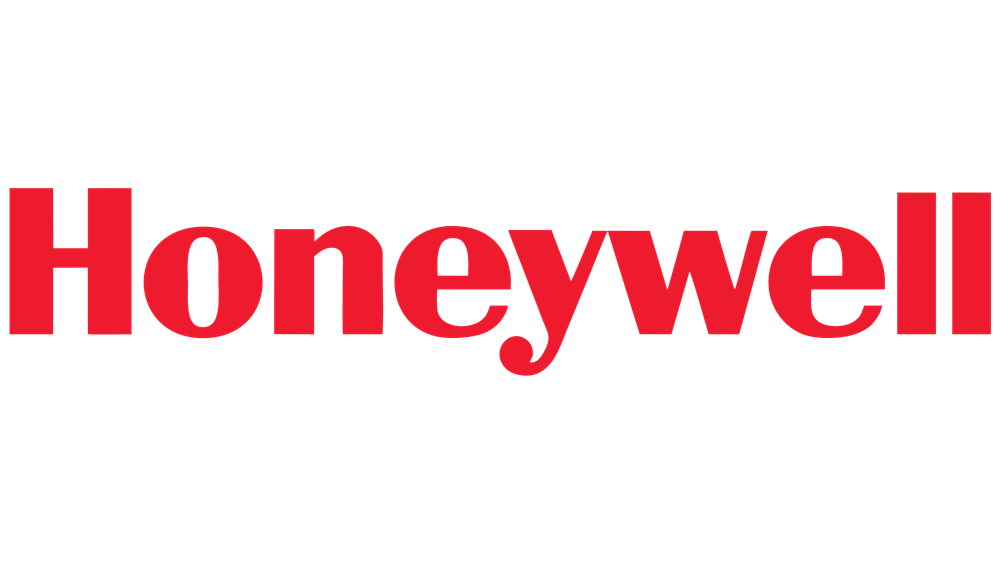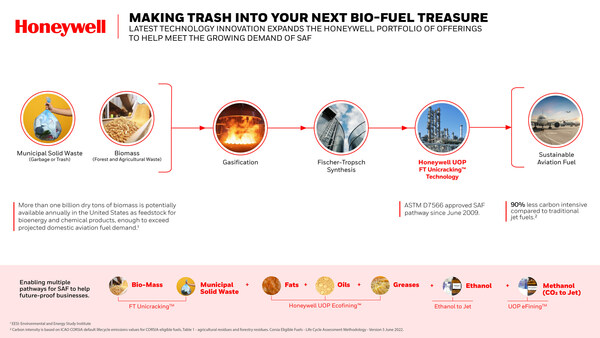
Honeywell Technology Helping to Produce Sustainable Aviation Fuel With Lower Cost and Waste
Published by Todd Bush on April 24, 2024
Latest technology expands Honeywell's portfolio of offerings to help meet growing demand for renewable jet fuel
DG Fuels to deploy new Honeywell technology in its SAF production plant
CHARLOTTE, N.C., April 24, 2024 /PRNewswire/ -- Honeywell (Nasdaq: HON) today announced its hydrocracking technology can be used to produce sustainable aviation fuel (SAF) from biomass, helping to make sustainable aviation fuel (SAF) that is 90% less carbon intensive than traditional fossil-based jet fuels1. The new technology produces 3-5% more SAF1,3, enables a cost reduction of up to 20%3,4 and reduces by-product waste streams as compared to other commonly used hydroprocessing technologies.

Honeywell's latest technology innovation, Honeywell FT Unicracking, can process waste biomass into more sustainable aviation fuel at a lower cost.
>> In Other News: Indigo Ag and Red Trail Energy Collaborate on Sustainable Biofuels to Maximize Benefits From Clean Fuel Tax Credit Programs
Honeywell's Fischer-Tropsch (FT) Unicracking™ technology takes liquids and waxes from processed biomass – including leftovers from crops, wood waste or food scraps – and can be used to produce SAF that complies with the strict standards of the aviation industry and with a lower environmental impact. This innovation demonstrates Honeywell's alignment of its portfolio with three compelling megatrends, including the energy transition.
"As demand for SAF continues to grow, the aviation industry is challenged by limited supplies of traditional SAF feedstocks such as vegetable oils, animal fats and waste oils," said Ken West, president and CEO of Honeywell Energy and Sustainability Solutions. "When combined with the existing Fischer-Tropsch process, our new technology will expand the feedstock options available in the industry to sources that are more plentiful, ultimately helping improve our customers' ability to produce SAF."
Recently, DG Fuels selected Honeywell's FT Unicracking technology for its biofuels manufacturing facility in Louisiana – the largest in the world for making SAF from the FT process – that will produce 13,000 barrels of SAF each day when it begins operations in 2028.
"Using Honeywell's advanced technology, DG Fuels will supply enough fuel for more than 30,000 transatlantic flights every year, contributing significantly to reducing the carbon emissions of global air travel," said Michael Darcy, CEO of DG Fuels. "This is a big leap forward in supporting the airline industry's goal of reaching net zero carbon emissions from international aviation by 2050."
Honeywell helped pioneer SAF production with its Ecofining™ process, which has been used to produce the fuel commercially since 2016. The company now offers solutions across a range of feedstocks to meet the rapidly growing demand for renewable fuels, including SAF. In addition to Honeywell Unicracking and Ecofining, Honeywell's renewable fuels portfolio includes Ethanol to Jet technology and eFining™, which converts green hydrogen and carbon dioxide into e-fuels. More than 50 sites globally have licensed Honeywell's SAF technologies, with refineries projected to exceed a combined capacity of more than 500,000 barrels of SAF per day when fully operational.
About Honeywell
Honeywell is an integrated operating company serving a broad range of industries and geographies around the world. Our business is aligned with three powerful megatrends – automation, the future of aviation and energy transition – underpinned by our Honeywell Accelerator operating system and Honeywell Connected Enterprise integrated software platform. As a trusted partner, we help organizations solve the world's toughest, most complex challenges, providing actionable solutions and innovations through our Aerospace Technologies, Industrial Automation, Building Automation and Energy and Sustainability Solutions business segments that help make the world smarter, safer and more sustainable. For more news and information on Honeywell, please visit www.honeywell.com/newsroom
1 Carbon intensity is based on ICAO CORSIA default lifecycle emissions values for CORSIA-eligible fuels, Table 1 - agricultural residues and forestry residues. Corsia Eligible Fuels - Life Cycle Assessment Methodology - Version 5 June 2022.
2 By utilizing proprietary SAF selective Honeywell UOP hydrocracking and hydro-isomerization catalysts.
3 By utilizing a Honeywell patent pending process configuration.
4 Based on internal UOP cost (Estimated Erected Cost) analysis that compares a typical configuration with the patent pending configuration.
>> In Company Spotlight: Honeywell International Inc
SOURCE Honeywell
Subscribe to the newsletter
Daily decarbonization data and news delivered to your inbox
Follow the money flow of climate, technology, and energy investments to uncover new opportunities and jobs.
Companies
Latest issues
-
Inside America’s Carbon Capture Reality Check
Inside This Issue ⚡ Duke Energy Florida Goes Live With First 100% Hydrogen System ✈️ Air bp Signs Agreement With Airbus on Flight Services and Fuel Supplies in Europe 🌊 Pairing Reefs and Mangroves...
-
Three Nebraska Plants Prove Ethanol CCS Actually Works
Inside this Issue 🌽 Three Nebraska Plants Prove Ethanol CCS Actually Works ☀️ SunHydrogen and CTF Solar Sign Agreement to Accelerate Hydrogen Panel Manufacturing 🧪 GenH2 Completes Major Milestone:...
-
DOE Doubles Down on $1/kg Clean Hydrogen Goal
Inside This Issue 🎯 Doe Doubles Down on $1/kg Clean Hydrogen Goal 🕳️ Quebec Introduces First Legal Framework for Underground CO2 Storage 🧪 Charbone Announces Its First Hydrogen Supply Hub in the O...
Company Announcements
-
JERA Announces Close of Haynesville Shale Gas Asset in Louisiana
TOKYO and HOUSTON, Feb. 12, 2026 /PRNewswire/ -- JERA Co. Inc., a global energy leader and Japan's largest power generation company, today announced that through its subsidiary JERA Americas Inc., ...
-
Buffalo Biodiesel Inc. (“BBD”), a leading recycler of waste vegetable used cooking oil (WVUCO) and producer of renewable feedstocks, announced that they have officially renewed a Part 364 Waste Tra...
-
Air bp Signs Agreement With Airbus on Flight Services and Fuel Supplies in Europe
Air bp has signed a multi-year contract with Airbus for the supply of conventional aviation fuel, sustainable aviation fuel (SAF), and related services in Germany and Spain. This agreement enables ...
-
BEND, Ore.--Element 1® Corp. (“e1”), an Oregon-based leader in methanol-to-hydrogen generation technology, today announced the signing of a Memorandum of Understanding (MOU) with Aurosi Precision C...